THIS POST MAY CONTAIN AFFILIATE LINKS. PLEASE SEE MY DISCLOSURES. FOR MORE INFORMATION.
Laundry is a necessity of life and sometimes an expensive one.
We all love to save money, but how can you lower the cost of washing your clothes?
You can save money on laundry by doing less laundry, but there have to other ways.
There are far more tricks you can use to save money on laundry.
In this article, I’ll talk about doing laundry more efficiently, using less energy, and some price comparisons between doing laundry at home and the laundromat.
#1. Wear Clothes More Than Once

We’re all guilty of wearing an item once and then throwing it in the laundry room, but do you need to wash everything after one use?
Definitely not.
Items like t-shirts and underwear should always be washed after wearing them, but other everyday things, like jeans and sweaters, can be worn more than once.
Before you throw your clothes into the hamper, ask yourself if they are dirty.
If you just wore them to run a few errands, you can get away with putting them back and wearing them again.
#2. Use Shorter Cycles

Washing your clothes on the shortest possible cycle will save you time, energy, and money.
Many washers, especially energy star or other high-efficiency washers, will have a “quick wash” cycle, so check all the settings.
Unless your clothes are very soiled, this cycle is sufficient for regular washing.
Dryers also typically have timed cycles, but many clothes, especially synthetic fabrics, will dry much faster than the recommended length of the cycle.
To avoid over-drying, set a shorter time or remove the clothes once they’ve dried.
If your dryer has a moisture sensor, make good use of it. The moisture sensor will end the cycle once all clothes are dry instead of waiting for a timed cycle.
#3. Use Cold Water

Water temperature makes a difference when it comes to your laundry.
Nowadays, many laundry detergents are formulated to work well with the cold setting and the traditional warm wash cycles of conventional models.
Washing with cold water saves money and energy, and you won’t have to worry about your clothes shrinking or fabrics bleeding.
If you need hot water to get some laundry clean, reduce the temperature on your washer or hot water heater to conserve energy.
Also, wash them separately from any items you could wash in cold water.
#4. Use Less Detergent

Many people use much more liquid detergent than they need to.
This can lead to all sorts of issues.
First, your clothes won’t be rinsed of all the detergent, so they will be crunchy to the touch and could trap odors.
Second, the extra detergent is hard on your washer too.
Using more detergent than you need can clog pumps and motors, causing you to pay hefty repair bills.
Be sure to double-check your laundry detergent for instructions on how much should be used for different sized loads, then use as little laundry detergent as you can.
#5. Don’t Use Fabric Softener

In addition to being a money-saving measure, fabric softener can have some detrimental effects on some clothing items.
The liquid coats your clothing to make it feel softer, but this liquid is filled with chemicals.
It can also damage your clothes too. For example, it can reduce the moisture-wicking properties of items like bath towels and workout clothes.
And this coating also applies to your washer and can cause increased maintenance costs.
The ideal solution is to skip the fabric softener altogether, but if you insist on using one, here are two safer and less expensive options.
Homemade Recipe #1
- 6 cups distilled white vinegar
- 1 cup baking soda
- 15 drops of essential oils (optional)
Mix the vinegar and essential oils and then add the baking soda and store it in a sealed container. Add 1 cup per load.
Reviews of this recipe are good, but many people find the following formula better.
Homemade Recipe #2
- 5 cups hot water
- 3 cups distilled white vinegar
- 1 cup hair conditioner
Mix the water and conditioner, then add the vinegar and store it in a sealed container. Add 1/2 cup per load.
Use either of these formulas or skip the fabric softener altogether and save money.
#6. Skip Dryer Sheets

Many people use dryer sheets to soften the feel of their clothes.
But these sheets do the same thing as a fabric softener, which is harming some of your clothes and your washer and dryer.
You are better off saving your money or looking for an alternative solution if you insist on the soft feeling of your clothing.
#7. Consider Using Dryer Balls

Speaking of alternatives to dryer sheets, consider dryer balls.
They are the size of a tennis ball made out of wool.
Putting them into your dryer lowers the static electricity and softens your clothes. Plus, they last a few years, so spending $10 goes a long way.
And if you don’t want to spend the money on wool dryer balls, grab some tennis balls and use them.
#8. Use Aluminum Foil

Take two sheets of aluminum foil and form two balls with them.
Then throw them into the washer.
They help keep your clothes separate and not bunch into balls, providing a more thorough cleaning.
When you switch your load of laundry over, you can throw the aluminum foil balls into the dryer, and they will work similarly to the wool balls mentioned above.
#9. Line Dry Your Clothes
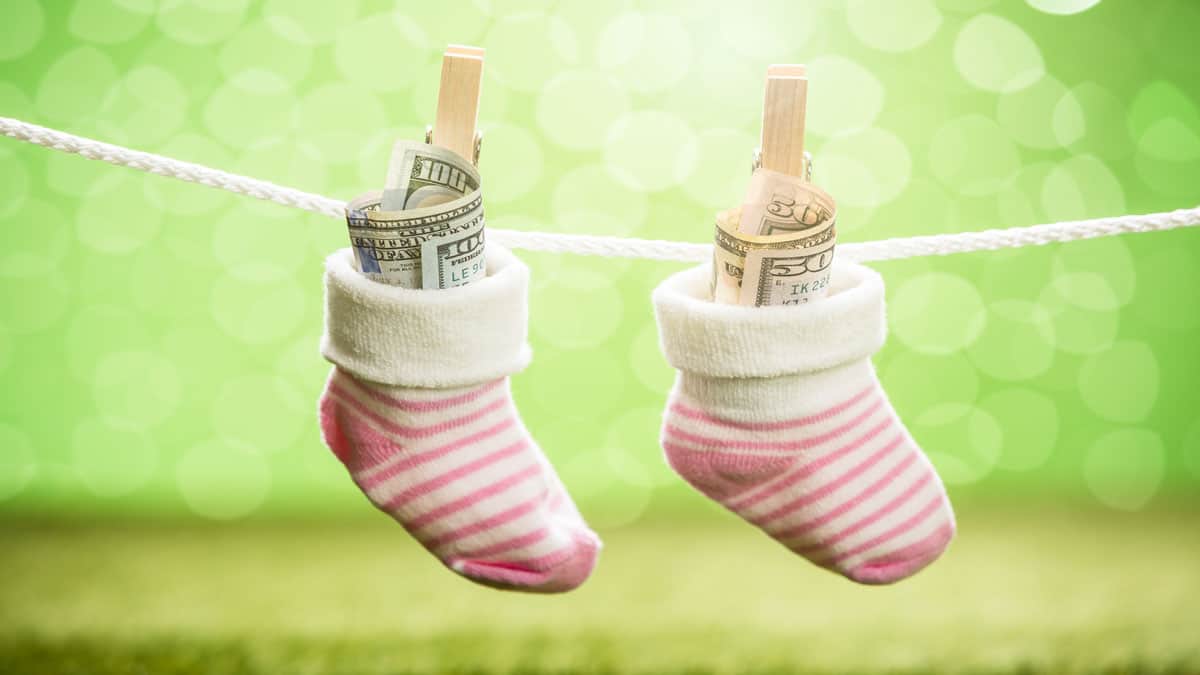
Skipping the dryer altogether can be a great way to lower energy costs.
Once you’ve got your clothes clean, you have a few options for drying.
- Drying rack. This is an excellent option for drying clothes indoors or outdoors. However, drying racks can sometimes be too small for large loads.
- Hang dry. Drying clothes on your balcony or backyard can be an excellent choice. If you don’t have much access to fresh air, you can even hang clothes inside to dry. An added benefit is in the winter months, the wet clothes can add humidity back into your house.
- Outdoor clothesline. Outdoor line drying is excellent if you have enough clothes and good weather. Line drying in the sun and fresh air is an amazing, energy-efficient, and cost-effective alternative.
#10. Use Generic Detergent

Store brand detergent costs less money and cleans just as well.
The Kirkland brand of laundry detergent is consistently ranked as one of the best performing brands to clean clothes.
At the very least, make it a point to shop around to find the best prices on detergent.
Many grocery stores will have higher prices than discount stores like Target or Amazon.
#11. DIY Detergent

Take the above point one step further, and you can make your own detergent.
There are mixed reviews out there, with some people saying these options work great, while others say the DIY versions aren’t great at removing tough stains.
Here is one famous recipe to try.
- 4 1/2 ounces shaved bar soap
- 14 ounces borax
- 14 ounces washing soda
Simply mix ingredients to great a powder and then use 1/2 to 1 tablespoon per load. This recipe makes 32 ounces of detergent.
There are other recipes out there, plus all sorts of homemade cleaning products you can create to save money.
#12. Take Advantage Of The Spin Cycle

Your washer uses less energy than your dryer, so the drier you can get your clothes first, the more money you will save.
This is where the spin cycle comes into play.
It is recommended that you use the highest spin cycle for your clothing so that the most excess water is removed. This will considerably lessen the drying time.
And for some fabrics, your clothes will be a little damp, allowing you to quickly air dry them.
#13. Do Full Loads

Use your washer less often by doing fewer loads.
By waiting until you have a full load of laundry, you will save money on water.
Plus, you will have more free time as you won’t be going to the washer multiple times a week to wash a small load.
#14. Put A Dry Towel In The Dryer

Another drying trick is to put a dry bath towel with the wet clothes in the dryer.
This helps speed up the drying process, lowering the cost of electricity.
#15. Use A Low Heat Setting

High heat can shorten the life span of your clothing, and it uses the most energy.
Using a lower heat setting, you protect your clothing and use less energy, even if you have a longer drying time.
#16. Perform Regular Maintenance
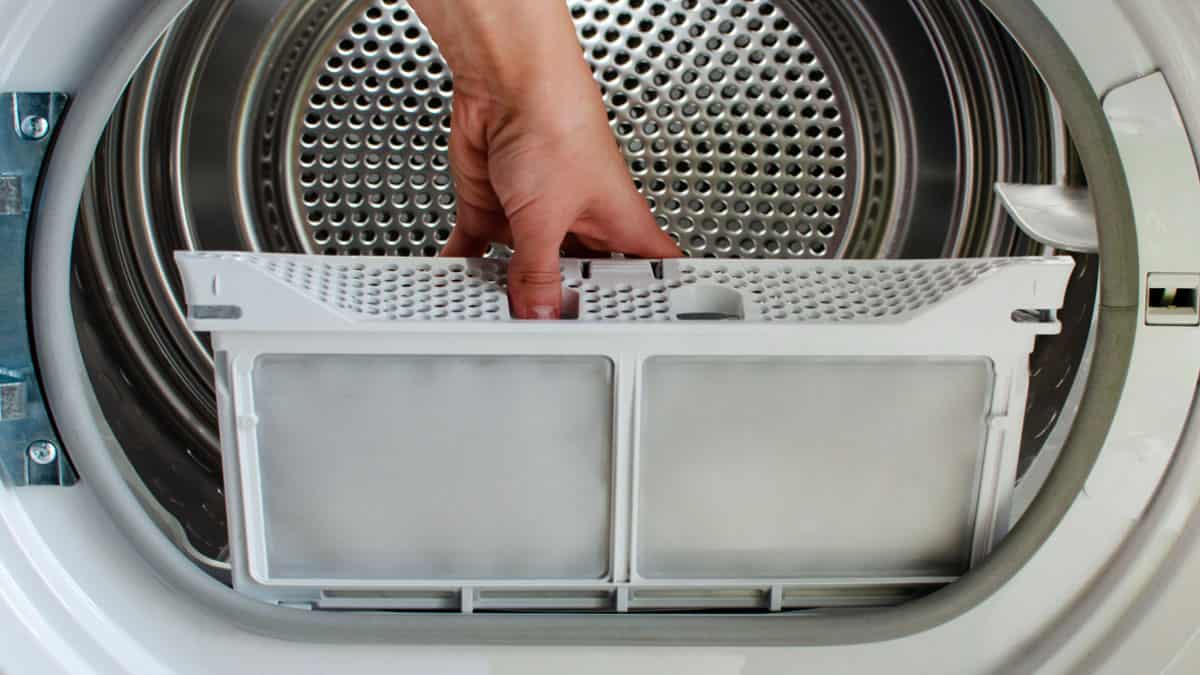
You must perform regular maintenance on your washer and dryer to get the most life out of them.
For your washer, make sure you leave the door open if it is a front load washer so it can air out.
This is because the rubber seal is prone to mildew growth. You also will want to give the seal a good clean every month too.
Another monthly maintenance item is to clean the washer tub. Most newer machines have a clean tub cycle where you run it without clothing.
In some cases, you can add vinegar to this cycle to clean the tub or add in a special cleaning solution.
Finally, inspect the hot and cold water hoses and replace them every few years. Make sure you clean out the dryer’s lint trap after every cycle.
A clogged lint filter will lower the efficiency and cost you more money.
You also will want to inspect the duct. If you have access to it, make sure it is sealed properly too, and clean out the dryer vent as this too can get clogged with lint.
Doing these simple things will extend the life of your machines and lower repair costs.
#17. Buy New Machines
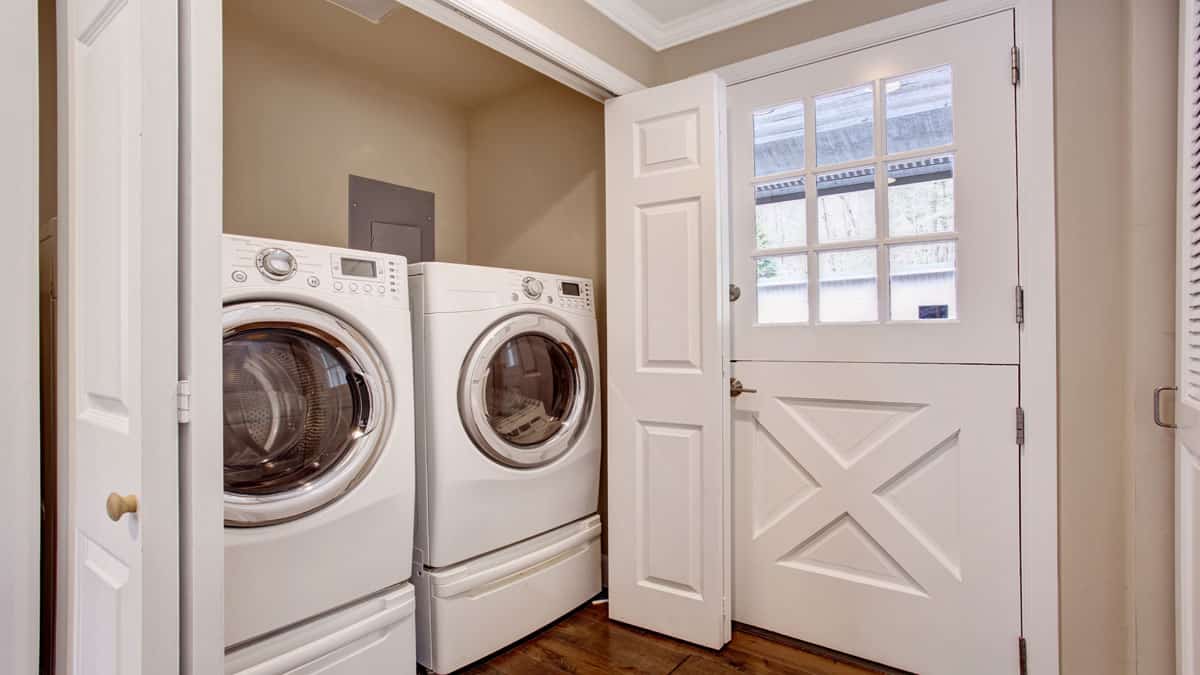
Finally, you might consider buying new machines if yours are old.
Most are energy star certified, lowering the amount of electricity used and saving money.
And a new high-efficiency washer uses the least amount of water possible.
When it comes to your dryer, you might consider a gas dryer if you have the right connections. These tend to conserve more energy than electric versions.
You can check out the Energystar website to find a list of machines to consider if replacing yours makes financial sense.
Is It Cheaper To Do Laundry At Home Or A Laundromat?
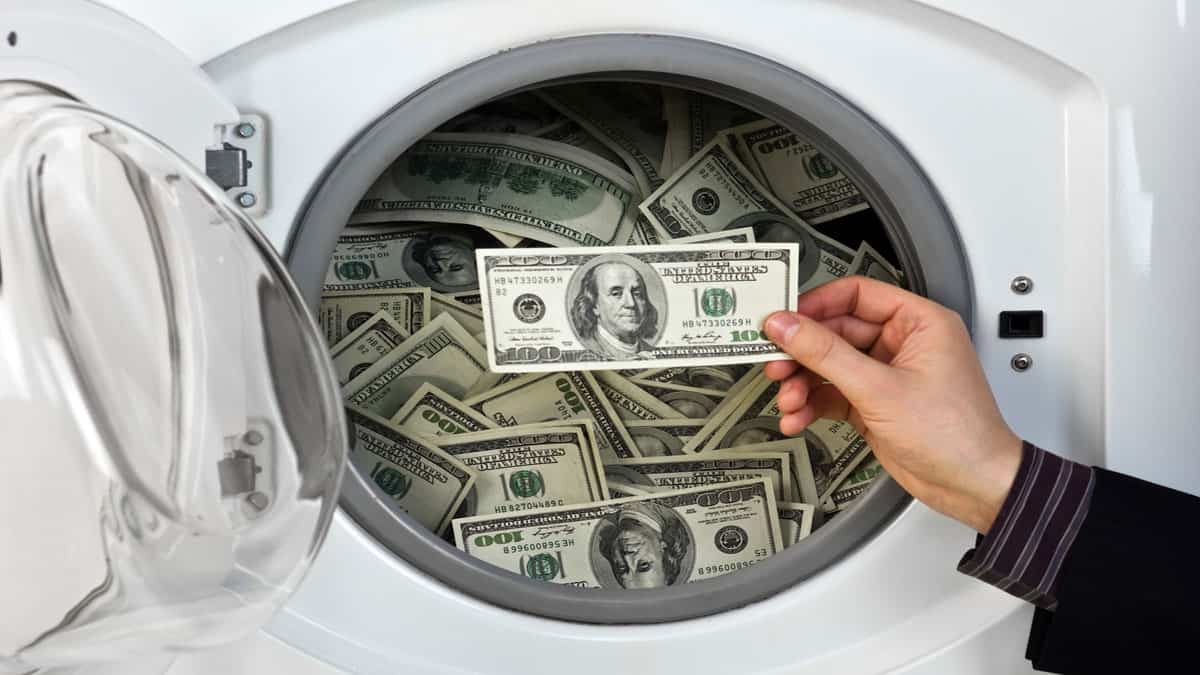
Running a load of laundry at home costs about $2-3, though rates depend on your location, the season, and the time of day.
However, this doesn’t consider the cost of buying and maintaining your washer and dryer.
Of course, if you take care of your machines, they will last a long time.
In contrast, the average cost for using a washer and dryer at the laundromat is around $3-4.
Though it seems counterintuitive, doing your laundry at a laundromat may be more cost-effective.
More From Money Smart Guides
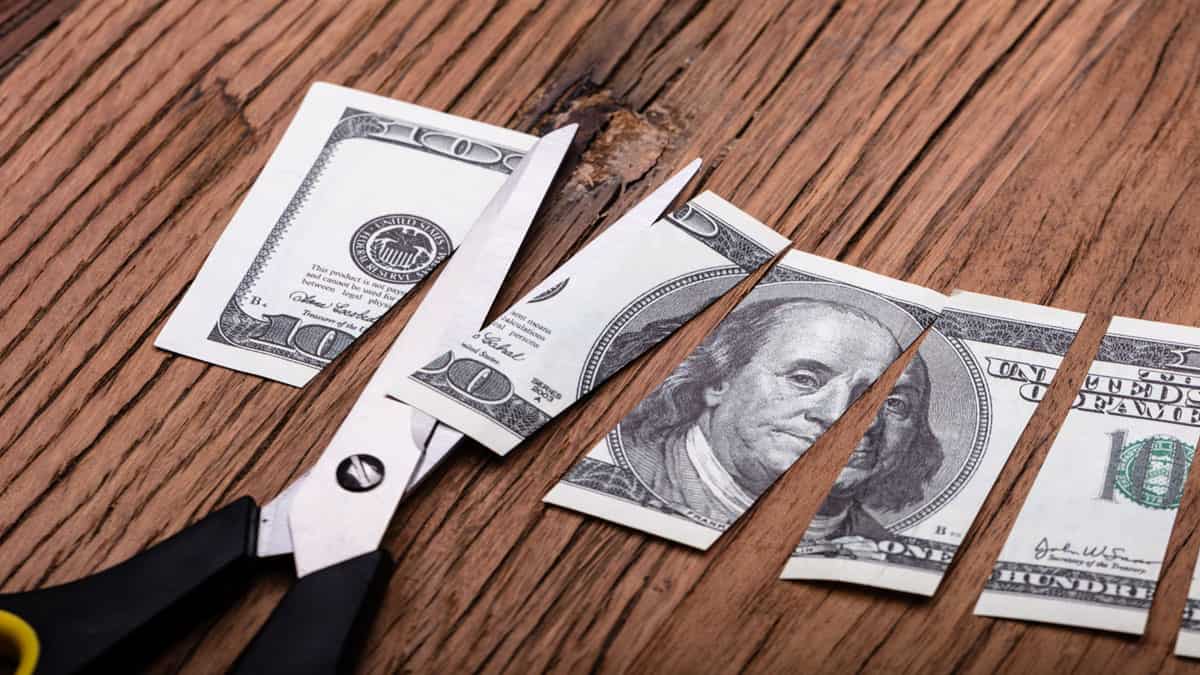
With inflation rising, your monthly bills are likely getting out of control. Luckily, there are some simple steps you can take. Use this guide to help you save up to $7,000 a year on your monthly bills.
SLASH YOUR MONTHLY BILLS AND SAVE
How To Save Money

If you want to get ahead financially, you need to put some money into savings on a regular basis.
Unfortunately, many of us never do. But that changes now. Here are over 100 simple things you can do to start saving money every day
Fun Money Saving Challenges

Do you find it boring to save money?
If you are motivation by turning things into a game, check out these money saving challenges. There is a game for you that will make saving fun and exciting so that you make it a priority to save money.
49 FUN MONEY SAVING CHALLENGES
Save Money On Groceries

It’s no secret that grocery shopping is a significant expense every month. While most of us know a few ways to reduce this bill, there are many other simple things we can do.
Learn the easy tricks to spend less on groceries and pocket some savings.
LEARN HOW TO SPEND LESS MONEY ON GROCERIES
Learn How To Get Free Samples By Mail

Everyone likes getting free stuff, but many times you have to fill out a survey. Here are some great ways to get free stuff without strings attached.
16 WAYS TO GET FREE SAMPLES BY MAIL WITHOUT SURVEYS
I have over 15 years experience in the financial services industry and 20 years investing in the stock market. I have both my undergrad and graduate degrees in Finance, and am FINRA Series 65 licensed and have a Certificate in Financial Planning.
Visit my About Me page to learn more about me and why I am your trusted personal finance expert.

